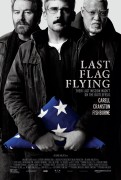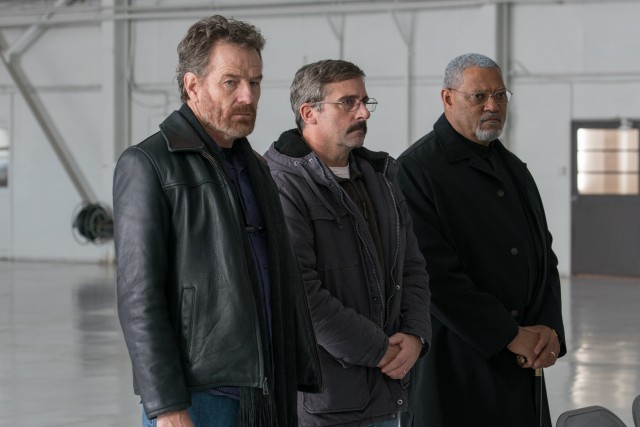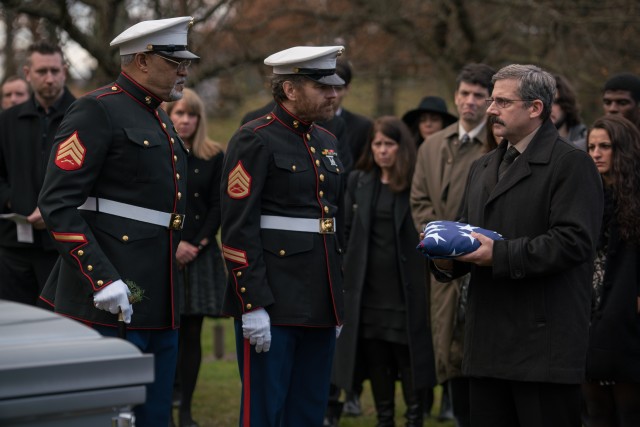Last Flag Flying Movie Review
 |
Last Flag Flying
Theatrical Release: November 3, 2017 / Running Time: 124 Minutes / Rating: R Director: Richard Linklater / Writers: Darryl Ponsican (novel & screenplay), Richard Linklater (screenplay) Cast: Steve Carell (Larry "Doc" Shepherd), Bryan Cranston (Sal Nealon), Laurence Fishburne (Reverend Richard Mueller), Yul Vazquez (Colonel Wilits), Cicely Tyson (Mrs. Hightower), J. Quinton Johnson (Washington), Deanna Reed-Foster (Ruth Mueller), Graham Wolfe (John Redman), Jeff Monahan (O'Toole) |
Writer-director Richard Linklater is mostly known for his original and personal films like Dazed and Confused, Boyhood, and the novennial European romance series that began with Before Sunrise. Set in 2003, Last Flag Flying opens with sad sack Larry "Doc" Shepherd (Steve Carell) paying a visit to the bar owned and run by his old friend and fellow Marine, Salvatore Nealon (Bryan Cranston). Doc and Sal fought in Vietnam together, but haven't seen each other in decades. Sal doesn't even recognize him. After a sloppy, late night together, the two former soldiers show up at the church with their other close friend from 'Nam, Richard Mueller (Laurence Fishburne), is now a preacher. Once the reunion moves to the house of Richard and his wife, the recently widowed Doc explains the reason for reconnecting. His son, Larry Jr., who followed his footsteps into the Marines, has just died in Baghdad and Larry wants his old war pals to join him in burying the young man.
To do so, they make a road trip to Arlington and then Delaware, where Doc looks at his son's body and, upon hearing the circumstances of his death "in action", plans to have him buried back in his hometown in New Hampshire in civilian clothes. The Marines (represented chiefly by a colonel played by Yul Vazquez) strongly discourage this plan, but they cannot forbid it. So, the guys rent a U-Haul truck with a hydraulic lift helping to secure the casket.
The funeral plans evolve, with the old friends briefly separating and then reconvening, as they then plan to travel with a military escort, a friend of the deceased, on a train. They move to Boston and New York, with New Hampshire standing as the trip's destination. But the casket is mainly an excuse for these old, estranged friends to reflect on their experiences together and apart in the decades since. Richard explains finding Jesus and finding his wife, two things he credits with helping him overcome his alcohol addiction, something that he claims, with good reason, torments Sal.
Like most good movies, Last Flag Flying is better than synopsis makes it sound. Three men talking on a train, in a truck, and in a hotel is not a design terribly far removed from Linklater's Before series and the director brings his usual knacks for character and dialogue. There is much to sink into here, on everything from having fought in a war of debatable value to the bonds that come from that experience to growing old and moving on after that.
Having arrived seconds late, it's possible I missed an onscreen caption, but if not, it takes a moment to realize just when the film is set. It's Christmastime 2003 and if you were even on the cusp of adulthood then, you may be shocked to realize that Christmas 2003 is absolutely long enough ago to render this a legitimate period film. Scenes in which the friends discuss, purchase, and play with cell phones may strike some as ludicrous, but they're not terribly exaggerated and they provide some humor. Linklater films always have some comedy and though this may be primarily classified as a drama, the levity sprinkled throughout is tasteful and complementary.
All three of the leads are seasoned in comedy, especially on television. But all three are also talented dramatic actors, something they display throughout to the film's great benefit. Though second billed (alphabetically?), Cranston has the true leading role and he truly shines in it. Sal is based on Nicholson's Billy Bad-Ass character, and you can tell that from the tone of the performance. I've repeatedly found Carell's film career paling in comparison to his great television creation, as he's gravitated to dumb, broad comedies like Get Smart and Date Night or sappy dramedies like Dan in Real Life and Crazy, Stupid, Love.. Here, his comic gifts are hidden in all but one funny conversation about erections and whorehouses. But he strikes you with his decency and vulnerability throughout, creating weight another actor wouldn't in what seems to be his best melancholic role since Little Miss Sunshine. Seizing his biggest film role in a while, Fishburne is on par with the others, even if his character doesn't have the same depths to explore.
With the exception of Boyhood, which emerged as a Best Picture favorite only to fall to Birdman, Linklater's work has mostly flown under the radar of awards organizations, aside from Adapted Screenplay nominations at the Oscars for the two Before sequels. He doesn't really make awards films and few of them have even opened around the end of the year. Last Flag Flying does and, with Amazon Studios backing a campaign, it could be a legitimate contender. It would be a serious contender at the Golden Globes if it were classified as a Comedy or Musical. In Drama (where I'm guessing it ends up), the competition is stiffer and that could easily be the first big shutout for a season that could be filled with them if critics and viewers don't fully embrace this film, whose aging male-driven narrative maybe doesn't fit the changing definition of what the Academy is supposed to celebrate. But it's a really enjoyable and rewarding film that should make an impression on you and stick with you long after it's done.
|
Related Reviews:
DVDizzy.com | DVD and Blu-ray Reviews | New and Upcoming DVD & Blu-ray Schedule | Upcoming Cover Art | Search This Site
DVDizzy.com Top Stories:
Now in Theaters: Justice League • Roman J. Israel, Esq. • Wonder • The Man Who Invented Christmas • Lady Bird • The Killing of a Sacred Deer • Murder on the Orient Express
Directed by Richard Linklater: Before Midnight • Slacker • Boyhood • Dazed and Confused • Everybody Wants Some!!
Bryan Cranston: Argo • The Infiltrator • Trumbo • Drive • Godzilla • Breaking Bad: The Complete Second Season
Steve Carell: The Big Short • Dan in Real Life • The Incredible Burt Wonderstone
In the Valley of Elah • American Sniper • Best Years of Our Lives
Text copyright 2017 DVDizzy.com. Images copyright 2017 Amazon Studios, Detour Filmproduction, Zenzero Pictures, Cinetic Media Production, and Roadside Attractions. Unauthorized reproduction prohibited.

